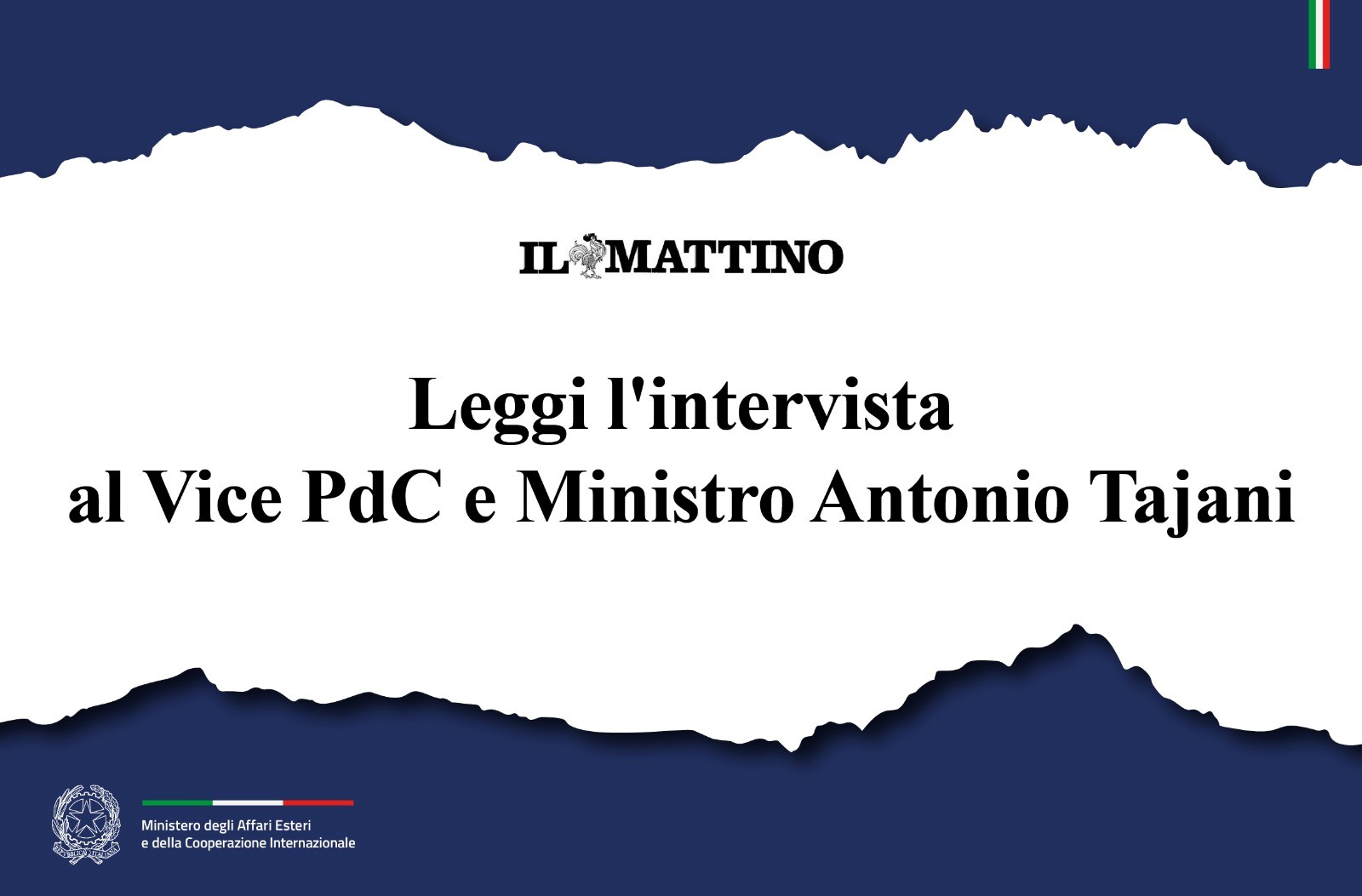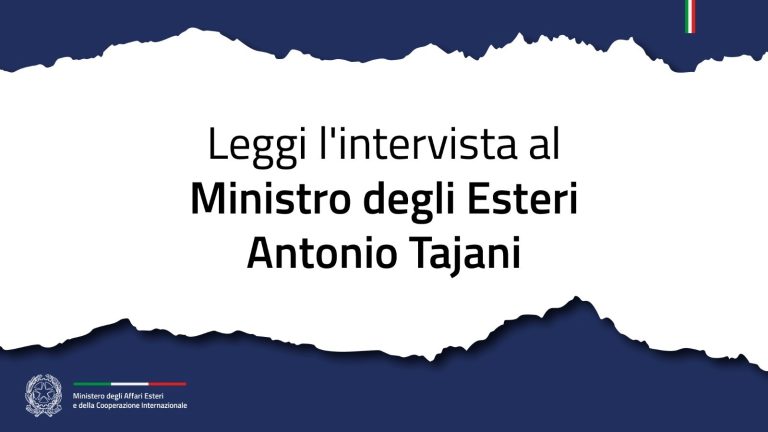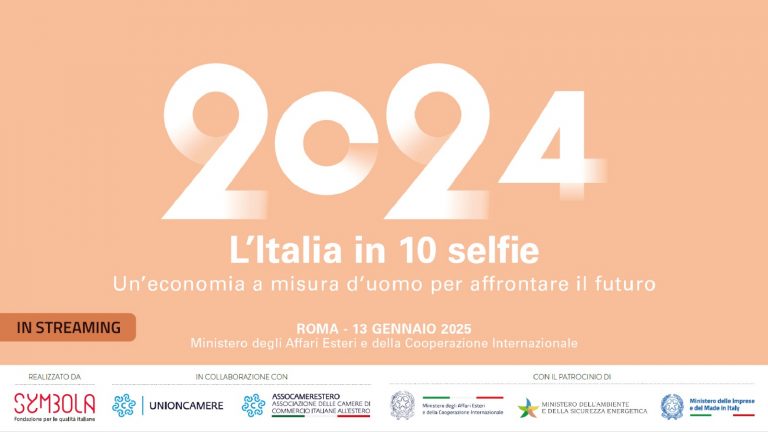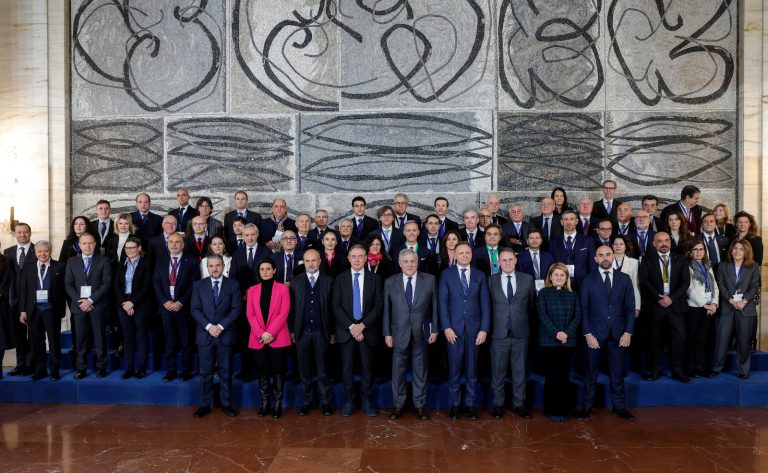The Foreign Minister said that this is how we support the growth of Made in Italy products. Southern Italy is strategic for the quality of supply and openness to innovation.
Naples, Gioia Tauro, Taranto and Sicily are important hubs for trade flows and freight routes. In terms of tariffs, Italy is more competitive than other countries in terms of product variety and quality of supply.
Minister Tajani, the Council of Ministers has approved the reform of the Foreign Ministry’s organisation. A measure of such magnitude has been lacking since 2010. Why now and what will change?
“In recent years, the role, areas of competence and influence of the Ministry of Foreign Affairs and International Cooperation have expanded. Italy’s international role needs to be promoted and supported, which also involves strengthening our companies and our economic, commercial and strategic interests abroad. Just think that today exports account for 30-40 per cent of GDP.”
Among the highlights of the reform is the establishment of a Directorate-General for Growth…
“The reform touches on various aspects: the keywords are debureaucratization and simplification with an important goal, i.e. to strengthen the country’s competitiveness. The Ministry will have two heads, one political and one economic, and among the pillars we have included a strong focus on IT and digital security. Then there is the entire operational area, which is aimed at strengthening the competitiveness of exports and Italian-made products and implementing our consular network and Italian schools abroad for the seven million compatriots around the world. We are focusing heavily on growth diplomacy.”
What are the medium-term goals?
“To support the activities of our companies, strengthen exports, and make Italy competitive in many markets thanks to opportunities and agreements we have already built and are building well beyond our relations with European countries. Through this strategy, we expect to reach 700 billion in exports by 2027; we are currently at 623.5 billion.’
Are there any privileged partners in this process?
“Made in Italy is a strong brand, appreciated and recognizable all over the world. We are looking with great interest at the Asian market, India, and Japan, but also at Mexico and Brazil. Moreover, for months, Italy has been forging economic and commercial partnerships with Arab countries. Last Thursday, I met with my Saudi colleague Faisal bin Farhan Al Saud: trade relations between Italy and Saudi Arabia are very positive, I have included Saudi Arabia in the Italian export plan, and Italian companies are ready to share their expertise and know how.”
How does this turn into concrete terms?
“Let me give you just one example: next autumn, the Salone del Mobile (Furniture Fair) will also open in Riyadh, but we have established relations within the Cotton Road, the IMEC corridor, considering the fundamental role that Saudi Arabia can play in the implementation of this project.”
When will the Mercosur agreement come into force?
“The EU Commission has already signed the agreement with the Latin American countries, and I believe that the latest difficulties identified by some European countries will be overcome. This is an important market. We are – quite rightly – negotiating guarantees for our agricultural businesses, in particular to protect quality products such as rice and meat.”
What are the prospects for Southern Italy in this scenario?
“This context opens up great opportunities for Southern Italy in a situation where the South as a whole is growing more than other areas of the country, thanks – in part – to the overall improvement in the quality of Southern companies, which are proving to be very competitive in terms of innovation and marketability. In this regard, the Ministry of Foreign Affairs, ITA, Simest, and Sace are contributing and will continue to contribute by providing all the necessary support to back this change.”
What aspects should be improved?
“First and foremost, the infrastructure network: making ports, airports, and freight villages technically adequate to support this development. The ports of Naples, Salerno, Gioia Tauro, Taranto, and Brindisi are of strategic importance in the Mediterranean, but Sicily’s infrastructure network is also heavily involved in this project with the development plan for Comiso airport. I am convinced that when the bridge is built, performance levels will be even higher.”
Are you concerned about the international game Italy and the EU are playing with the USA over tariffs?
“Tariffs are negative in themselves. Bearing this in mind, I believe that Italy has everything it needs to better respond to this situation, thanks to its more dynamic propensity to operate in new markets. There are at least two fundamental reasons for this: a greater variety of products to offer to meet the needs of markets other than the USA and the EU; and a competitive advantage due to the undisputed quality of Made in Italy products, which can withstand the impact of a possible increase in costs and prices. The growth diplomacy we intend to pursue goes precisely in this direction: supporting the internationalization of companies; neutralizing the effect of tariffs; attracting innovative foreign investment, and integrating the promotion of exports with that of our excellence in key sectors such as culture and sports. An operations centre dedicated exclusively to exports and internationalization will soon be inaugurated, and we will continue our relationship with CRUI to activate internships, which are currently at 900 per year.”
You have just landed in Copenaghen for The Foreign Affairs Council meeting convened by the the danish Presidency: what are the items on the agenda?
“With regard to Ukraine, this is the first discussion among the 27 EU Foreign Ministers since the Summits in Alaska and Washington. The topics under discussion include European cohesion and transatlantic unity, European security and defence, and the need for security guarantees for Ukraine based on Article 5 of the NATO Treaty. With specific reference to the Middle East, the debate will focus on humanitarian efforts in Gaza and stabilization through a possible Arab-led mission under the auspices of the UN. As to Iran, the EU High Representative for Foreign Affairs, Kaja Kallas, and the German Foreign Minister, Johann Wadephul, will provide updates on the latest meeting between the E3 (France, Germany, and the United Kingdom) and the EU with their Iranian counterparts on nuclear issues, and the follow-up to the activation of the snapback of UN sanctions against Iran, suspended in 2016, will be discussed.
You have always emphasized the importance of the Mediterranean, the strategic role of the “Southern Flank,” also for NATO, and international cooperation. How has the Italian proposal been viewed?
“The EU has repeatedly acknowledged Italy’s leading role in addressing the strategic issue of the Southern Flank and the need to protect and strengthen the Mediterranean basin. The cooperation efforts we are pursuing with the Mattei Plan for Africa are moving in this direction. Security and peace remain fundamental to economic, commercial, and cooperation development: the UN Security Council has just approved the latest extension of the UNIFIL mission in Lebanon, confirming Italy’s leading role until the end of 2026. Our efforts are now focused on Gaza to achieve an immediate ceasefire.”





